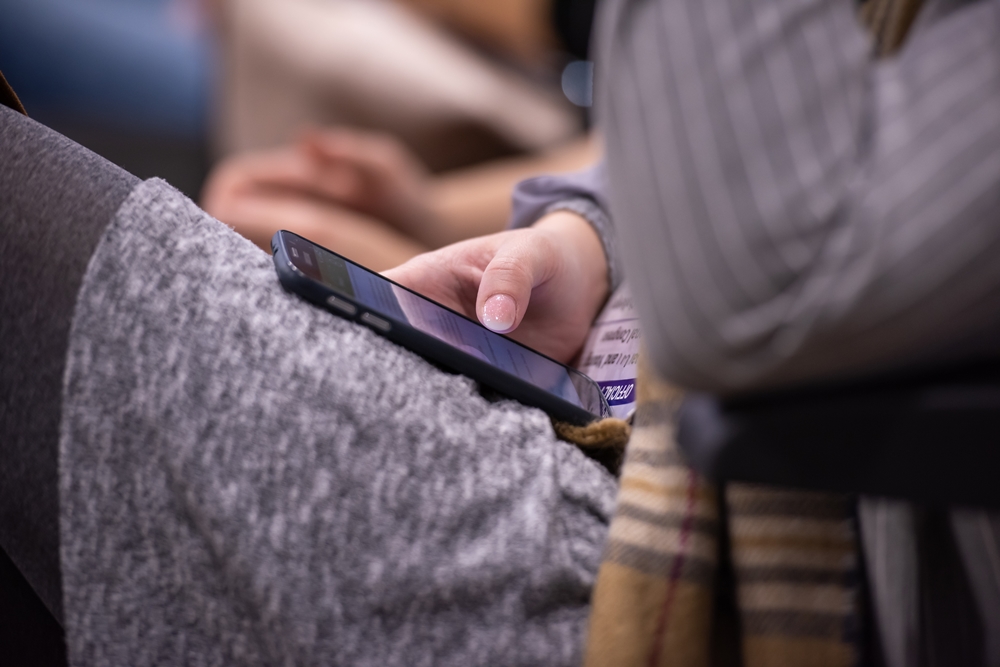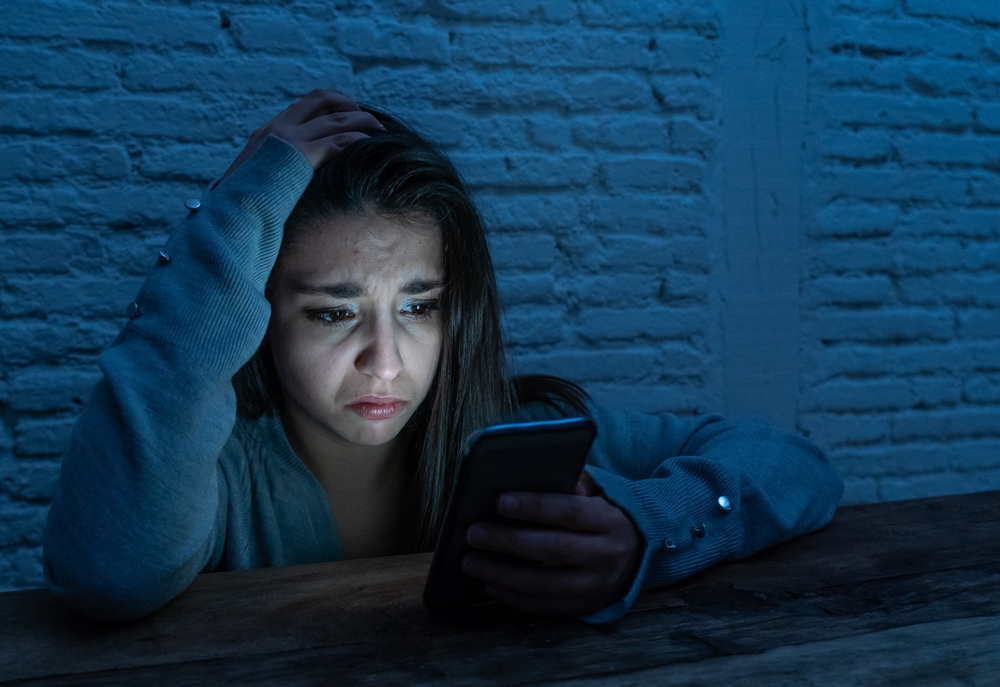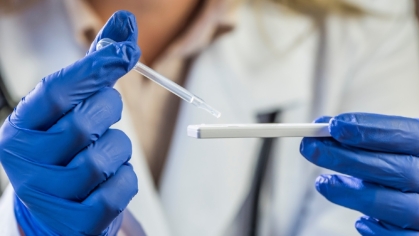Phones and Social Media Play Significant Role in Girls’ Juvenile Justice Experiences, Says Graduating Doctoral Student’s Research
As a graduate student in her native United Kingdom, Michelle Lyttle Storrod studied the impact and influence of social media platforms and mobile devices on street gangs.

Graduating Ph.D. student Michelle Lyttle Storrod explains that one of the most significant findings from her doctoral research is that phones provide a lifeline for girls in the juvenile justice system.
The Rutgers University–Camden doctoral student would later become a nationally recognized authority on issues related to gangs and social media as a founding member of the London-based nonprofit Growing Against Violence (GAV) and a longtime consultant for the Ministry of Justice, the Metropolitan Police, and the National Health Service.
However, in her research and policy experience, Lyttle Storrod noticed how girls’ experiences were often overlooked and ignored within the research, as well as by policies and services.
“I wanted to get girls’ opinions on social media use and understand how this was part of their criminalization and victimization experiences,” says Lyttle Storrod, who will graduate this May with a Ph.D. in childhood studies. “Together with the girls, I also wanted to challenge policies and practices that discriminate against them and cause them ongoing harm.”
Over the course of her Rutgers–Camden doctoral work, Lyttle Storrod dedicated herself to the issue, looking at how social media are used as technological means of control and thus catalysts for physical and sexual violence. In addition, she studied how girls in particular are criminalized for experiences of digital victimization that the juvenile justice system finds difficult to understand.
She explains that one of the most significant findings from her doctoral research is that phones provide a lifeline for girls in the juvenile justice system. They need phones and access to Wi-Fi to help them feel safe while moving around a city and dealing with difficult home lives. Many of the girls with whom she spoke explained that they use GPS and location-sharing services in order to check in and make sure that their friends and family are safe. They also share their own locations to make sure someone always knows where they are.

Lyttle Storrod says that girls she studied needed phones and access to Wi-Fi to help them feel safe while moving around a city and dealing with difficult home lives.
“This is vastly different from my previous research where gangs used location services to surveil and monitor girls as a means of control,” she says.
She further explains girls in her U.S.-based research also spoke about using phones to support them emotionally; being able to contact friends and family 24/7 helped them to feel supported and cared for. Girls also used features on phones to block out arguments in the home or sounds of gunshots when they were trying to sleep.
“They would use YouTube or music to help them sleep and some would write fan fiction, poems, or songs to help express difficult emotions stemming from abusive situations,” says Storrod.
She also notes that when phones were taken away from girls, as they often were as part of court orders, this caused the girls a great amount of stress and prevented them from being able to fully engage with school, work opportunities, and maintaining important social connections. Some of the girls also needed to be able to check social media to see if someone was threatening them or coming after them, so they could protect themselves and their family. Without a phone, the girls were not able to manage their own risk; they were in more danger.
“Living without a phone was an alien concept to the girls who have been born into a digitalized society,” says Storrod. “It made life even more difficult for them, and even increased the likelihood of them being involved in crime.”
Lyttle Storrod says that one of the most enjoyable parts of her research was being able to develop her analytical approach, particularly the digital aspects, with the girls who took part in the research.
“The girls taught me so much about how to carry out research ‘with’ them in a way that keeps them safe, respects their boundaries, and gives them options within the process,” she says.

“I wanted to get girls’ opinions on social media use and understand how this was part of their criminalization and victimization experiences.” Michelle Lyttle Storrod
In addition to her research, Lyttle Storrod co-chairs a girls’ working group at the Camden County Hall of Justice, which provides girls with services that they need to prevent them from spending time in detention. The group also trains practitioners on the specific harms that girls face.
Lyttle Storrod has also remained committed to influencing policy and practice on the issues of youth gangs and social media. As a member of GAV, she has helped to lead violence-prevention programs for youth ages 10 to 18 on the dangers of gangs and extreme violence. It is the largest violence-prevention initiative in Europe, with more than 150,000 students in 600 schools across London and southeast England attending one of its sessions. Moreover, she has worked extensively with local and national institutional and government agencies to advocate for policy changes related to a range of social issues.
During the COVID-19 pandemic, she has helped to adapt GAV sessions to a virtual and hybrid format to ensure that even if children are not in school, they can still access the curriculum and receive support. She is also currently co-authoring some new GAV sessions that will support younger students with understanding issues such as racism, sexism, homophobia, hate crimes, and class-based discrimination. Additionally, she is revising messages around violence against women and girls across the curriculum.
She is currently in talks with national children’s welfare and safeguarding agencies on changing patterns of victimization related to young people who spend increasing amounts of time online.
“It is part of action planning with schools, police, and welfare agencies on how to deal with disclosures of sexual abuse when children return to school following lockdowns,” she says.

Lyttle Storrod explains that, without a phone, the girls were not able to manage their own risk; they were in more danger.
The Rutgers–Camden doctoral candidate also continues to serve as a consultant for U.K. agencies on issues related to gangs and social media. During the COVID-19 pandemic, she has been involved in discussions with the agencies on the impact COVID-19 is having on young people involved in the juvenile justice system, particularly the unhealthy conditions of prisons and detention facilities.
She recently wrote an op-ed and an article supporting the U.N. Committee on the Rights of the Child recommendation that children be released from these facilities immediately.
“It is never healthy to lock up children, and COVID-19 is exasperating this issue for children, whose physical and mental well-being is suffering,” she says.
Reflecting on her time at Rutgers–Camden, Lyttle Storrod believes she has grown both academically and personally. She is now working on publishing her dissertation research, with thoughts of turning it into a book.
Upon graduating, Lyttle Storrod will begin her tenure-track position at Widener University as an assistant professor of criminal justice. She will also remain in Camden County, where she plans to stay committed to continuing her work with girls in the juvenile justice system to support transitions in services, policy, and practices toward healing, supportive, transformative experiences for girls.
She calls all her academic and community endeavors a “labor of love,” believing in her heart that it is work that she needs to do.
“There are countless vulnerable young people out there who are crying out for additional understanding and support,” she says. “We need to listen to them and take issues related to social media seriously, supporting professionals and policymakers to do the same.”


